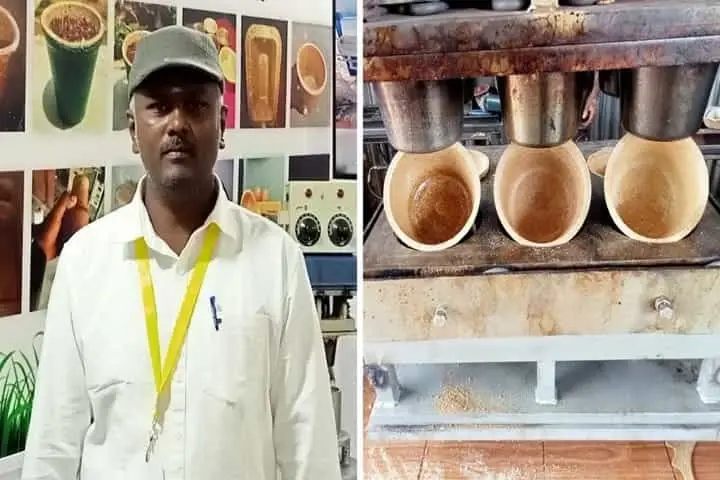

Coimbatore-based Kalyana Kumar uses organic material to create cups and containers which are eco-friendly replacement of those made from single-use plastic
<p>
<strong>Cups, plates, forks, containers, glasses, etc made of plastic are convenient and cheap yet they cause a lot of harm to the environment as they are not biodegradable. Coimbatore-based Kalyana Kumar, 39, has found an apt solution to this problem by making these objects with eco-friendly materials that can be even used as cattle feed!</strong></p>
<p>
Kumar&rsquo;s firm SPS Kalyan Machine Designers, has innovated machinery that creates these single-use cutlery and containers using varied natural waste materials.</p>
<p>
<iframe allow="accelerometer; autoplay; clipboard-write; encrypted-media; gyroscope; picture-in-picture" allowfullscreen="" frameborder="0" height="315" src="https://www.youtube.com/embed/EsWfcC81FCk" title="YouTube video player" width="560"></iframe></p>
<p>
Talking to Better India, Kumar said: &ldquo;Paaku Mattai (areca leaf plates) is a widely used alternative to paper plates. It was one of the few available options of organic raw material that requires less processing. But I found that manufacturers depended on Karnataka for its availability. But since the leaves are only available for six months a year, they faced huge losses in the remaining time. That&rsquo;s what inspired me to use different raw materials that would be available throughout the year.&rdquo;</p>
<p>
The college dropout, who discontinued his BBA degree to manage his father&rsquo;s business, using his ingenuity made machinery that makes alternatives to single-use plastic with over 15 materials. These materials include bran of wheat and rice, wood powder, fibre of banana, haystacks, vegetable waste, palm tree and tapioca cassava fibre. From these he churns out 10 different types of products, like four types of wine and juice glasses, five types of teacups, flasks, airtight flasks, water bottles, and food containers.</p>
<p>
These objects can be turned into cattle feed.</p>
<p>
Kumar and his team spend a lot of time doing research and development on raw materials to be used. Sharing his experiences, he said: &ldquo;A customer from Belgium asked us if it is possible to make organic sustainable products out of beer waste. We conducted a study and understood that was possible, and explained the process to them. Similarly, we gave an idea of raw materials from wheat bran to a customer from Andaman. For a customer from Ramanathapuram, we suggested using vegetable waste to make organic containers.&rdquo;</p>
<p>
The price of the machinery and products depends on the raw materials used. &ldquo;Teacups made out of banana bran or wood powder, would cost only 50 paise per piece. If made out of wheat bran, the same costs Rs 3.&rdquo; Likewise, machinery cost can vary from Rs.3 lakhs to Rs.35 lakhs.</p>
<p>
&nbsp;&ldquo;Shifting to sustainable products is the need of the hour and I hope more companies and groups take up this alternative,&rdquo; averred Kumar.</p>
<p>
<strong>Also read: <a href="https://www.indianarrative.com/culture-news/karnataka-students-show-how-eco-friendly-bamboo-is-a-cheaper-alternative-to-steel-140906.html">Karnataka students show how eco-friendly bamboo is a cheaper alternative to steel</a></strong></p>
The Russian military has carried out a series of strikes on Ukrainian military-related targets in…
India's toy industry, once heavily dependent on imports, is now manufacturing domestically and exporting to…
Members of the Indian diaspora and several artists in Argentina welcomed Prime Minister Narendra Modi…
Sub Lieutenant Astha Poonia officially became the first woman to be streamed into the fighter…
As Israel awaits Hamas's response on Friday to the latest proposal for a hostage release…
Deputy Chief of Army Staff (Capability Development and Sustenance), Lieutenant General Rahul R Singh, on…